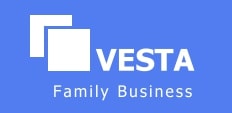2022-10-12
Family Businesses (FB) play a pivotal role for the economy of the EU as they account for an important part of European private employment (average of 40 – 50% of all jobs). With an overall amount of 14 million of enterprises and around 60 million of jobs in the EU private sector, Family Businesses generate around 50 % of the EU GDP. This produces also an indirect economic impact as Family Businesses reinvest profits, create long-term strategy towards stakeholder interests, (including employees, customers, shareholders and local communities) and transmit family and economic values to the new generations. The background and rationale of the VESTA project – a transnational initiatives co-financed by the E+ programme of the European Commission – was tailored to foster long-term oriented and sustainable training solutions that could greatly enhance the competitive edge of FB.
After two years of non-stop implementation, on Sep 2022 the project finally came to its conclusion celebrated with the final closing meeting hosted by the Malaga-based partner. The event represent an opportunity perform a summative evaluation of the project, reflect of lessons learnt, and most importantly, to extrapolate crucial takeaways from the deployment in pilot version of the toolkit and training resources designed by partners, and reflect on outline and content of the two last deliverables foreseen by the project plan. These two documents are strategically designed to support the transferability of project’s results and deliverables in other training and education ecosystems – so as to provide for all the resources and wealth of knowledge that STKHs and groups of interest need to replicate VESTA-like initiatives – and a set of concise and comprehensive set of policy recommendations triggered by the analysis at cross-national level performed by partners to identify the training areas of interest later tackled by the training curricula.
The Operational Guidelines represents a sort of digital legacy of the VESTA project, fully available in free and open access format to other organisations and institutions that would like to capitalize on partners’ experience in implementation to develop their own VESTA-inspired training and education programme. The nature, scale and scope of this deliverable is fully compliant to the expectations and formal requirement of the E+ programme when it comes to future sustainability and long-term effect of any transnational initiative supported by it. Based on their lessons learnt, partners compiled for stakeholders use a set of guidelines that they can rely on to replicate the project, make use and operationalise its resources, or come up with original initiatives tailored on their ecosystem of practice.
The Policy Recommendations are addressed to a different cohort, meaning public authorities and policy makers which have an impact of action, frameworks, funding programmes, etc., in the field of entrepreneurial support, private sector development, and education and training in general. The research carried out by partners at proposal stage and during project implementation proved for the existence of solid opportunities for growth, competitiveness and development of FB that would be much more easily triggered starting from a policy based intervention.
On the basis of the main challenges that Family Businesses have to face, we identified a set of specific priorities covered by tailored VESTA deliverables:
• the key concept of the importance of preparing business transfers early
• the awareness and ability on how to access to finance
• taxation fiscal issues
• family governance and talent retention
• (digital) entrepreneurship education and family-business-specific management training
 EN
EN ES
ES IT
IT SI
SI DE
DE